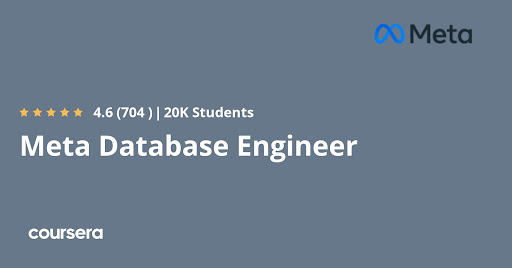Hello guys, If you're aiming to break into the data engineering field or looking to boost your career with a recognized credential, the Meta Database Engineer Professional Certificate on Coursera might have caught your attention. Offered by Meta (formerly Facebook), this program is designed to teach foundational to intermediate skills in database engineering—covering everything from relational databases and SQL to data modeling and cloud database solutions. It's marketed as a job-ready pathway, especially for those interested in roles like data engineer, database administrator, or back-end developer.
But with so many online certifications available today, you might be wondering: Is this Meta certificate actually worth it? In this article, we’ll explore what the program includes, who it's for, how long it takes to complete, what career advantages it offers, and whether it lives up to its promise of preparing you for real-world database engineering roles.
Let’s dive into the details and help you decide if the Meta Database Engineer Professional Certificate is the right investment for your time and money. Would you like me to help structure the full article next?
Is Meta Database Engineer Professional Certificate worth it?
Let's find out whether Is Meta Database Engineer Professional Certificate worth it or not but evaluating course on different parameters like instructor expertise, course content, curriculum and structure and whether its project based or not.
1. The Instructor Review
This course is taught by the Meta platform which was Facebook previously. There are a lot of other courses that the Meta platform teaches in Coursera and it has a good reputation among people which proves the quality of their instructors with a 4.6 rating score for this Meta Database Engineer Professional Certificate.
2. Course Review
2.1. Introduction to Databases
Learning how to work with databases is a very important skill in many industries such as web development, data science, and mobile app development. This course will help you learn the SQL language and how to run queries in the database.
Later, you will understand the SQL operators and sorting data and filtering data by extracting only specific data that meets the conditions. Finally, learn about database design.
2.2. Version Control
You will probably work at a company at a certain time in your life and therefore you need to learn how to collaborate with others on one project so you will use version control.
You will learn how to use the command line in the Linux operating system to work with files and create a workflow to automate your work and use Git to manage team files.
2.3. Database Structures and Management with MySQL
There are a lot of types of databases and one of the most common is called MySQL which is an open-source relational database management system. You will start this part by learning how to use MySQL to build, modify, and query regional databases. Later, you will learn to update the database and work with tables.
2.4. Advanced MySQL Topics
This part will push you from a beginner to an advanced level in using the MySQL database. You will start by learning how to develop a user-defined function and also the core rules and guidelines for database optimization and learn about the MySQL common table expression.
2.5. Programming in Python
Python become one of the most commonly used programming languages and can be used in almost every industry. You will start this part as a beginner and learn the basics of this language such as variables and getting user input.
Later, learn the control flow and use functions to make the code smaller and easier to understand. Finally, learn about algorithms, object-oriented programming, and using libraries to extend the functionalities of your code.
2.6. Database Clients
Python is used often to connect with the database and change the data you will start by making a python code to create and perform other actions on the MySQL database and perform queries in the MySQL database using python such as filtering and sorting data.
Later, learn advanced topics in MySQL database such as working with different MySQL functions using python language. Finally, apply what you’ve learned so far to make a useful application.
2.7. Advanced Data Modeling
This part will teach you some of the advanced database concepts and you will start by understanding the data modeling concepts and learning data management in MySQL workbench.
Also, understand how the data warehouse plays an important role in data analytics. Later, you will learn how advanced analytics tools are used to evaluate business performance. Finally, apply data modeling to a real-world project.
2.8. Database Engineer Capstone
After completing the previous parts of this course, you are going to make a project to solve a real-world problem which is making a database and client for a lemon restaurant.
You get information about what you will do in the project then you will create visual tables for the project. Finally, visualize the sales of the restaurant and implement a database client in the python language.
2.9. Coding Interview Preparation
Before you apply to get a job, it would be much better to learn how the coding interview works so you will prepare yourself to have a higher chance of acceptance and this part will help you do this. You will learn also about the data structure and covering the algorithms.
Conclusion
Thanks for reading! This course will help you learn well about the database and will help you get an overview of the database engineer career but also you need to learn more since this industry is extensive.











No comments :
Post a Comment